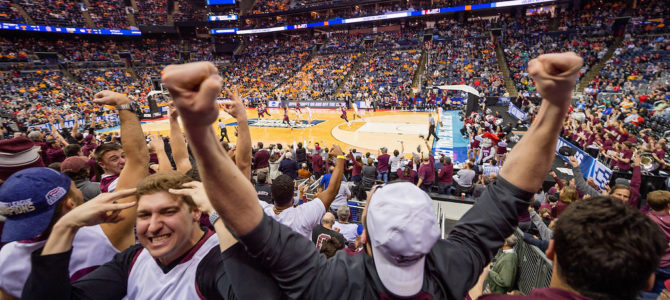
A year ago, the China virus hit. Few in their right minds other than someone with a 10 Cloverfield Lane doomsday bunker could have predicted the tyrannical shutdowns that would follow.
Among the upending of civil society and the tension leading up to a November WWE-style showdown between the “mean orange man” and “Sleepy Joe,” the grandeur of March Madness got tossed aside. With Selection Sunday 72 hours away, the NCAA pulled the plug on March 12 last year. It was a huge bummer.
The NCAA college basketball tournament brings Americans together year after year for buzzer-beaters, miracle upsets, near-perfect brackets, and camera shots of Mike Krzyzewski, John Calipari, or Roy Williams yelling like madmen.
In our country deeply wounded by the politicizing of professional sports—and of all aspects of society—March Madness is one of the last events unaffected by hypnotizing partisan warfare. It is something we can all believe in, tragic as it may sound for the public to resort to relying on college kids playing basketball to keep the social fabric together.
While the old order in Washington fiddles with its re-establishment of centralized control, and President Joe Biden increasingly melts into oblivion and his handlers take over, March Madness is a place for Americans to escape. “Escape” may be a dirty word among political diehards and strategists who might rather sit frantically in front of the television and analyze each incomprehensible that Biden utters, but it’s true. Americans need entertainment outlets—outlets distinct from Hollywood’s increasingly politically correct turmoil.
There is something thrilling in life about watching the little guy succeed. Less and less in our elitist sociopolitical climate does it happen. American culture has not been uprooted by major corporations like Big Tech, but willfully handed over by politicians who could not care less about the values we wish to preserve.
In light of this, what could be better than watching small-town, no-name colleges upset the Dukes and Michigans and Syracuses of the NCAA? And what does our enjoyment of this event called March Madness tell us about a thirst so ingrained in the American psyche for those doubted and forgotten and told they are not good enough to rise up and flick the bird to the establishment?
March Madness is a hypnotizing and thrilling sort of entertainment, wherein everyone and his brother, sister, half-sister, aunt, and uncle have two screens open at school or work, referencing their bracket under the table. Everyone has a bracket story—the thirteenth seed you randomly picked to beat a number one. Or the time you went on a whim and picked an underdog to win just because his colors looked cool, or because you know someone, who knows someone, who went to a school somewhere near the team playing—sort of—and then they actually won.
It all represents the grand and speculative and beautiful thing that makes America America.

Yesterday, Selection Sunday happened. A year later, as we continue to live among the shifting goalposts and tune out the tiresome words of the ever-hypocritical Dr. Anthony Fauci, there is a clear sense that honest culture is lacking; a culture that allows us to forget about the fact that the political division has led to a scenario where even the idea of talking has become impossible.
On March 18, four teams will compete in Bloomington, Ind. to see which two small fish are strong enough to enter the big pond. The first round will start a day later in Bloomington and West Lafayette. Then it is off to Lucas Oil Stadium, where the Indianapolis Colts play, for the National Championship. The number one seeds this year are Gonzaga, Baylor, Illinois, and Michigan, in that order.
“As the political and the cultural merge, Unionist Americans feel that the tectonic plates themselves will come crashing down through the crust,” writes Ben Shapiro in his most recent book, “revealing gaps far wider and more dangerous than the moderate-sized trembles we feel every day.”
This points to why nothing could be more imperative today than to sustain a culture once steeped in camaraderie. This camaraderie is dying, as the right and left shuffle into separate Zoom rooms, geographic regions, pockets of America that are wiped clean of substantive discourse, until society fully resembles two different countries interwoven among these 50 states.
March Madness can hopefully alleviate the madness our elites have plunged Americans into, if only for one month. Time to sit back and watch the underdog stick it to the man on the hardwood floor. Because what could be more American?









